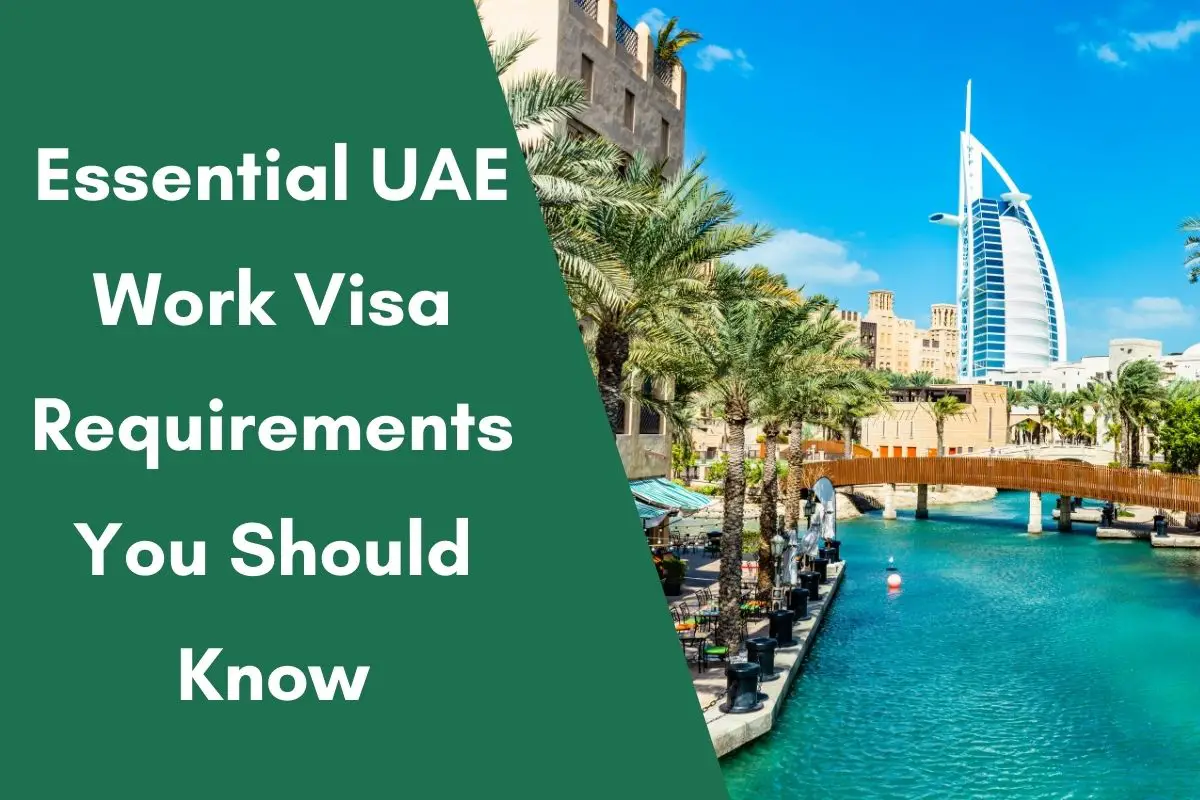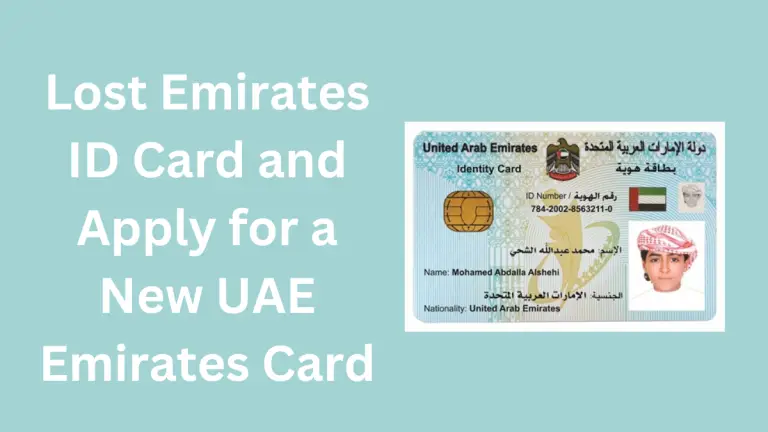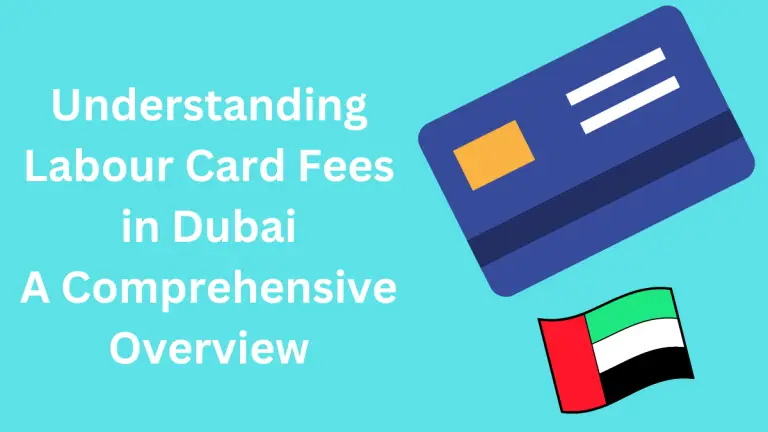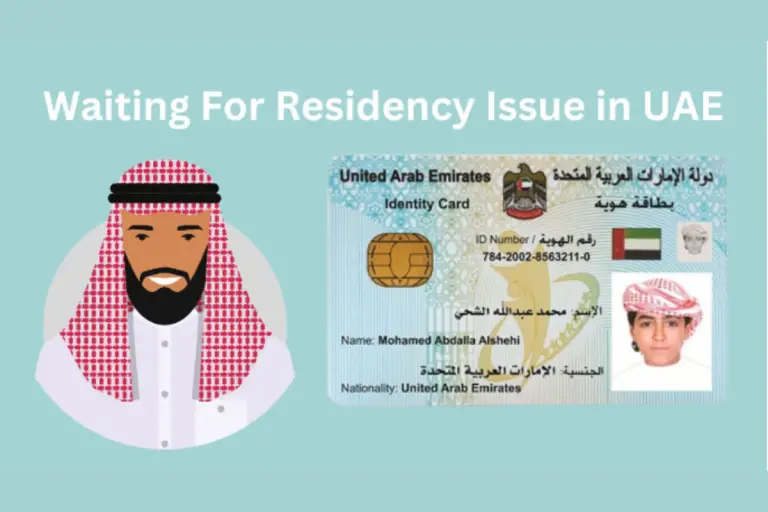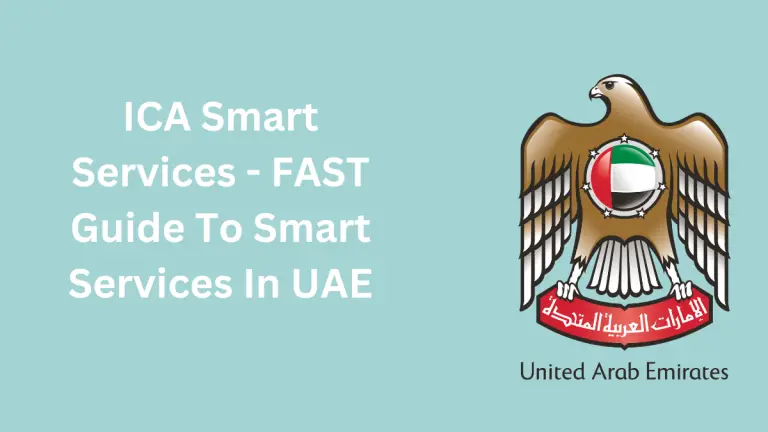Essential UAE Work Visa Requirements You Should Know
Are you ready for an exciting journey to work in the United Arab Emirates (UAE)?
The UAE is like a place full of opportunities, where people from all over the world go to make their job dreams come true.
Imagine I’m like a super knowledgeable person who has helped lots of people with UAE visas for more than 20 years.
In this guide, I’ll help you understand how to get a UAE work visa and what are UAE Work Visa Requirements. It might seem a little tricky but don’t worry. We’ll go through all the important stuff step by step, and soon you’ll know everything you need to have a great career in the UAE.
Types of UAE Work Visas: Understanding Your Options
Before making your career move to the UAE, it’s essential to grasp the intricacies of the various UAE work visas available. The choice of visa type can significantly impact your stay and career prospects in this vibrant country.
Let’s delve into the three main categories of UAE & Dubai work visas, each catering to unique circumstances.
Standard Work Visa: A Closer Look
The Standard Work Visa is the bedrock of employment in the UAE for expatriates. This employer-sponsored visa provides an opportunity for foreign nationals to live and work as employees in the UAE, typically for a duration of two to three years. After this period, the employer has the responsibility to either renew or cancel the visa.
This visa category stands as one of the most prevalent options for both job seekers and employers seeking to hire talent in the UAE. It hinges on the existence of a valid employment contract and necessitates approval from the Ministry of Human Resources and Emiratization (MoHRE).
Before stepping foot on UAE soil with a Standard Work Visa, a foreign national must formally accept a written job offer and secure an entry permit. This entry permit acts as the gateway to the UAE, initiating the process of formalizing the employment visa and residency visa.
Green Visa: Empowering Freelancers and Self-Employed Individuals
In October 2022, the UAE introduced the Green Visa, a revolutionary step aimed at attracting and nurturing foreign freelancers and self-employed individuals within its borders. The Green Visa opens the doors to a five-year residency in the UAE, distinct from the conventional UAE work visas, as it liberates holders from the need for employer sponsorship.
Beyond the freedom from employer ties, the Green Visa offers additional advantages, such as the ability to sponsor immediate relatives for UAE relocation, a six-month grace period upon visa expiry or cancellation, and a simplified application procedure.
The documentation requirements for securing a Green Visa can vary based on the applicant’s specific work category. Nevertheless, typical prerequisites include a valid employment contract or self-employment permit from MoHRE, evidence of educational qualifications, and proof of adequate income during the applicant’s stay in the UAE.
Golden Visa: An Exclusive Haven for Exceptional Talents
The UAE’s Golden Visa, often seen as a privilege bestowed upon professionals with extraordinary qualifications, extends a remarkable ten-year residence permit. This visa class permits holders to not only live and work but also pursue academic endeavors within the UAE, all without the need for a local sponsor.
Common beneficiaries of the Golden Visa include doctors, scientists, athletes, inventors, artists, healthcare professionals, and other distinguished individuals.
Golden Visa holders enjoy an array of perks, including access to exclusive health insurance packages and the privilege of sponsoring an unlimited number of immediate family members and support staff. Furthermore, they can spend an unlimited duration outside the UAE without jeopardizing the validity of their visa.
The prerequisites for a Golden Visa vary according to the applicant’s background and qualifications. A convenient eligibility quiz available on the Federal Authority for Identity, Citizenship, Customs, and Port Security (ICP) website serves as a valuable resource to determine one’s eligibility for this prestigious visa.
In conclusion, comprehending the nuances of UAE work visas empowers individuals to make informed decisions about their professional aspirations in this dynamic nation. Whether you opt for the stability of a Standard Work Visa, the freedom of a Green Visa, or the exclusivity of a Golden Visa, each category offers a unique pathway to fulfilling your career ambitions in the UAE.
Related Reading:
- Sharjah Driving Licence Renewal: The Essential Guide for Every Motorist
- Emirates ID Renewal: What Happens If You Forget To Renew Emirates ID Card in The UAE?
- Jobs in Dubai and UAE: Which Jobs Are Available in Dubai?
Who Is Eligible to Obtain a UAE Work Visa?
Understanding your eligibility is the first step in the UAE work visa application process. Eligibility criteria may vary slightly depending on the specific visa type, but some common requirements include:
- A valid employment offer from a UAE-based employer (for Standard Work Visa)
- Meeting age and skill criteria (for Golden Visa)
- Demonstrating a sustainable income source (for Green Visa)
- Clear criminal record
- Good health condition
Requirements to Obtain UAE Work Visas
Once you meet the eligibility criteria, you’ll need to gather the necessary documents and fulfill certain requirements to obtain your UAE work visa. The exact requirements can vary, but some fundamental documents include:
- Passport with at least 6 months of validity
- Passport-size photographs
- Employment contract
- Visa application forms
- Health insurance coverage
- Proof of accommodation in the UAE
- Education and qualification certificates
What is the UAE Work Permit fees?
When embarking on your journey to obtain a UAE work permit, it’s essential to have a clear understanding of the associated fees. UAE work permit fees are categorized into three levels—A, B, and C—each with its own cost structure.
Let’s delve into the specifics of these fees to help you navigate this crucial aspect of your UAE employment process.
Level A: AED 600
At Level A, the UAE work permit fee is set at AED 600. This entry-level fee is applicable to certain categories of foreign workers seeking employment in the UAE. While it represents an economical option, it’s essential to ensure that your profession falls within this fee category to take advantage of this cost-effective work permit.
Level B: AED 1,500
Moving up to Level B, the UAE work permit fee increases to AED 1,500. This fee category encompasses a broader range of professions and is often chosen by individuals with diverse skill sets. While it incurs a higher cost than Level A, it offers access to a wider array of employment opportunities in the UAE.
Level C: AED 2,000
Level C represents the highest tier of UAE work permit fees, with a cost of AED 2,000. This fee category typically applies to individuals in specialized or high-demand professions. If your qualifications and expertise align with these roles, Level C offers the most comprehensive access to the UAE job market.
It’s crucial to note that the specific fee category you fall into is determined by your profession and qualifications. To ensure you pay the appropriate fee and expedite your work permit application, consult with your prospective employer or the relevant UAE government authorities.
Understanding the UAE work permit fee structure is a key step in securing your work permit and embarking on a successful career journey in this vibrant country.
Step-by-Process to Get an Entry Visa for the UAE
The process of obtaining a UAE work visa can seem complex, but breaking it down into steps can make it more manageable. Here’s a step-by-step guide to securing your entry visa for the UAE:
Visa Quota Approval Application
Before you can apply for a work visa, your UAE-based employer must obtain a visa quota approval from the Ministry of Human Resources and Emiratisation (MOHRE). This step ensures that there is a sufficient number of work visas available for your profession.
Submission of Employment Contract
Once the quota is approved, your employer will provide you with an employment contract. Review it carefully to ensure that it accurately reflects the terms and conditions of your employment.
Work Permit Application Approval
Your employer will then submit your work permit application to the MOHRE. This process involves verifying your qualifications and eligibility for the chosen position.
Entering the UAE with a Pink Visa
After the work permit is approved, you’ll receive a “pink visa,” which allows you to enter the UAE. You’ll have a limited time frame to complete the remaining steps.
Obtaining Residence Visa and Work Permit
Upon entering the UAE, you must undergo medical examinations and apply for your residence visa and work permit. These documents will grant you legal permission to live and work in the country.
Getting an Emirates ID
The Emirates ID is a crucial identification card for residents in the UAE. You’ll need to apply for it after receiving your residence visa.
Get a Medical Checkup
A mandatory medical checkup ensures that you are in good health and free from contagious diseases. It’s a standard procedure for work visa applicants.
Submit a Labor Contract
Your employment contract will be registered with the MOHRE, providing legal protection for both you and your employer.
Get Health Insurance
Health insurance is mandatory in the UAE. Ensure you have a valid health insurance policy that covers your medical expenses.
Related Reading:
- Jobs in Dubai and UAE: Which Jobs Are Available in Dubai?
- Understanding Labour Card Fees in Dubai: A Comprehensive Overview
- Lost Emirates ID Card and Apply for a New UAE Emirates Card
Considerations Before Obtaining a Work Visa in the UAE
Embarking on a journey to work in the United Arab Emirates (UAE) is an exciting opportunity, but it’s essential to tread carefully and consider several critical factors before taking the plunge. These considerations can significantly impact your experience and success in the UAE job market.
Let’s explore these essential factors to ensure you are well-prepared for your professional venture in the UAE.
Cost of Living in the UAE
Understanding the cost of living in the UAE is pivotal in managing your finances and ensuring a comfortable lifestyle. The UAE boasts a reputation for luxury and opulence, but expenses can vary significantly depending on your chosen city, lifestyle, and family size. Research the cost of housing, transportation, education, and daily essentials to create a realistic budget that aligns with your income.
Cultural Norms and Etiquette
The UAE is known for its rich cultural heritage and diverse expatriate population. It’s crucial to familiarize yourself with the cultural norms and etiquette that govern social interactions and professional conduct in the country. Respect for local customs, dress codes, and traditions is essential for building positive relationships with colleagues and locals alike.
Language Requirements
While English is widely spoken and understood in the UAE, Arabic is the official language. Depending on your job and industry, proficiency in Arabic may be advantageous. Consider taking language courses to enhance your communication skills and immerse yourself in the local culture. Being bilingual can open doors to a broader range of job opportunities and enrich your overall experience.
Housing and Accommodation Options
Selecting the right housing and accommodation is a crucial decision. UAE cities offer a variety of options, from luxurious apartments and villas to more budget-friendly residences. Research neighborhoods, amenities, and proximity to your workplace to find the ideal living situation. Be aware that rental costs can vary significantly between areas, so budget accordingly.
Taxation Rules and Regulations
Understanding the UAE’s taxation rules and regulations is vital for managing your financial affairs. The UAE does not impose income tax on individuals, making it an attractive destination for expatriates. However, other fees and charges, such as Value Added Tax (VAT), may apply to specific goods and services. Familiarize yourself with tax policies to ensure compliance and avoid any unexpected financial implications.
In conclusion, before obtaining a work visa in the UAE, thorough consideration of these factors is essential. By meticulously planning for the cost of living, respecting cultural norms, enhancing language skills, choosing suitable accommodation, and understanding taxation rules, you can embark on your UAE career journey with confidence and make the most of this exciting opportunity.
Conclusion
Securing a UAE work visa is a vital step toward achieving your career goals in this dynamic nation. By grasping the fundamental requirements, eligibility, and application process, you pave the way for a smooth journey. Think of it as assembling the pieces of a puzzle, each bringing you closer to your dream career.
With knowledge as your guide, you’ll navigate this path with confidence. Embrace this opportunity, and may your UAE career be filled with success and fulfillment.
Related Reading:
- What Are UAE Visa Requirements? All You Need to Know About UAE Visa Rules 2023
- ICA Smart Services – FAST Guide To Smart Services In UAE
- UAE Visa Check by Passport Number: How to Verify Your Dubai Visa Status Online
FAQs
Can I apply for a UAE work visa without a job offer?
No, you need a valid employment offer from a UAE-based employer to apply for a work visa.
What is the validity of a Standard Work Visa?
The validity of a Standard Work Visa varies but is often linked to your employment contract.
How long does it take to obtain a Golden Visa?
The processing time for a Golden Visa may vary but can take a few weeks to several months, depending on the specific circumstances.
Is health insurance mandatory for UAE work visa holders?
Yes, health insurance is a mandatory requirement for all UAE work visa holders.
Can I change jobs in the UAE on a Standard Work Visa?
You can change jobs in the UAE, but it typically requires the approval of your current employer and the new employer, as well as a No Objection Certificate (NOC).
Are there age restrictions for the Golden Visa?
While there are no strict age restrictions, the Golden Visa is typically granted to individuals with exceptional skills, qualifications, and contributions.
